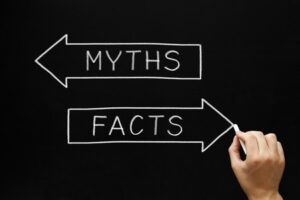The 6 Most Common Myths About Aging–Debunked
By now, you have probably heard that 70 is the new 50 (or whatever decade you want to plug in)!
But what can you learn from this new breed of age-defying, physically active, mentally sharp, and emotionally fulfilled older adults?
In one word: OPTIMISM
Healthy octogenarians and even centenarians are proving that “normal” aging is different from what we once thought.
Growing older is no longer about what you lose but just as much about what you can gain. In this new view of old age, you can realistically expect enjoying life physically, emotionally, and spiritually into your 80’s, 90’s, and beyond.
“Growing older is no longer about what you lose but as much about what you can gain” (click to Tweet)
Nonetheless, many long held myths about aging still exist. The following six are ones you should no longer believe.
Myth #1: The normal aging process inevitably leads to debility
While it may seem hard to believe, it is often diseases, rather than the process of normal aging, that rob you from the ability to stay active and engaged in your later years.
And averting common diseases—and hence functioning well into old age—is more in your control that you may think.
Nearly ninety percent of heart disease and eighty percent of adult onset diabetes can be prevented through dietary and lifestyle choices. Even more staggering are the numbers behind cancer. Researchers at University of Texas M. D. Anderson cancer center estimate that ninety to ninety five percent of cancer is driven by largely controllable environmental and lifestyle factors, such as cigarette smoke, pollutants, stress level, dietary and exercise habits.
Myth #2: Your genes determine how long you will live
Although having good genes is a blessing, only a small percentage of how long you will live, as well as how healthy you will live, is encoded in your genes.
By following nearly three thousand sets of Danish twins throughout most of their lives, researchers from Denmark estimate that only about twenty five percent of longevity is based on your genetics while nearly seventy five percent depends on your lifestyle choices.
Myth #3: You will “feel” your age
Your chronologic age does not predict how you will biologically age. Although certain genes may be programmed to turn on or off according to a certain chronologic timeline, the “wear and tear” that takes place in your body from processes such as inflammation and free radical damage can determine how young you biologically feel at any age.
You can slow or accelerate your rate of aging by counteracting inflammatory and oxidative damage through your dietary intake of anti-inflammatory, anti-oxidant rich foods, and through exercise.
Myth #4: It’s all “down hill”
Aging is just as much a process of growth and development as it is of physical decline. Unleashing your middle age and beyond creativity, wisdom, and emotional intelligence can make the latter half of life rewarding and fulfilling.
Life experiences and new learning constantly strengthen and rewire brain circuits until your middle age brain develops from a dial up to a turbo charged broadband connection. By becoming better at recruiting help from your logical left brain and your intuitive right brain, your mind becomes more agile at cross indexing knowledge, problem solving quicker, and thinking “out of the box.”
Myth #5: It’s too late for me
While you may feel that it’s too difficult or futile to change your health habits late in life, even small changes, at any age, can make a big difference.
According to a 2001 study from Washington University School of Medicine, frail older men and women can make muscle protein to a similar magnitude as middle age adults and young adults after a short two week or longer three month weight lifting program.
Numerous other studies have shown that beginning exercise late in life, even among frail nursing home residents, can improve strength and physical functioning. Feel inspired?
Myth #6: Your physical health determines how you will age
Your emotions, beliefs, and expectations are just as important as your physical health in determining your lifespan and health span.
Your attitude, which has many dimensions, influences your rate of aging through chemical messengers, such as cortisol, released during your evolutionarily designed flight-or-flight stress response.
Among the attitude traits that can help you live an exceptionally long life are optimism, living with purpose, adapting to life’s circumstances, and maintaining a sense of humor.
Ready to take the next step?
By moving beyond these myths, you can change your expectations about how you will feel and function as you get older.
Question? Are there ways you can think of getting more out of each passing year? Share your answer on Twitter, Facebook, or LinkedIn.
